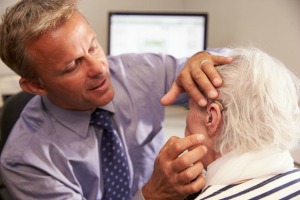An audiologist is a highly trained healthcare professional specializing in the diagnosis, treatment, and management of hearing and balance-related disorders. Diagnosing hearing issues is a fundamental part of their work, and it involves a comprehensive and systematic approach. Seniors go through many changes as they age, including the changes that occur in their hearing. Both in-home care providers and loved ones can help seniors when hearing issues arise, and that starts with understanding how an audiologist can diagnose hearing issues.
Case History

The diagnostic process typically begins with a thorough case history. The audiologist will interview the patient to gather information about their medical history, lifestyle, and any specific concerns related to their hearing. This information helps in understanding potential causes and provides valuable context for further evaluations. Loved ones can also assist in this process, letting the audiologist know their concerns and patterns they’ve seen.
Otoscopy
An audiologist may perform otoscopy, which involves examining the outer ear and ear canal using a specialized instrument called an otoscope. This helps identify any visible issues, such as earwax buildup, infections, or abnormalities in the ear canal or eardrum.
Pure-Tone Audiometry
Pure-tone audiometry is one of the most common tests used by audiologists to assess a patient’s hearing sensitivity. The patient wears headphones and listens to a series of tones at different frequencies and loudness levels. The audiologist records the softest sounds the patient can hear at each frequency, creating an audiogram.
Speech Audiometry
In addition to pure tones, speech audiometry evaluates the patient’s ability to understand spoken words. The audiologist may ask the patient to repeat words or sentences at various volume levels to assess speech recognition. This is also another instance where loved ones can assist, as well as the in-home care aides familiar with the senior.
Tympanometry
Tympanometry measures the mobility of the eardrum and the middle ear’s pressure. This test helps identify problems related to the middle ear, such as eustachian tube dysfunction or issues with the ossicles (the small bones in the middle ear).
Acoustic Reflex Testing
This test evaluates the involuntary contraction of the stapedius muscle in response to loud sounds. Abnormal reflexes can indicate issues with the auditory system.
Otoacoustic Emissions (OAE) Testing
OAE testing assesses the function of the cochlea, the inner ear’s sensory organ. It measures the sounds generated by the cochlea in response to auditory stimulation. Absent or abnormal OAEs can indicate hearing loss.
Auditory Brainstem Response (ABR) Testing
ABR is used to assess the integrity of the auditory pathway, from the ear to the brainstem. Electrodes are placed on the scalp to record the brain’s response to sound stimuli.
Real Ear Measurement (REM)
REM is a procedure that involves measuring the sound levels within the ear canal to ensure that hearing aids or other amplification devices are providing the appropriate amplification for the individual’s hearing loss.
Based on the results of these tests, the audiologist can diagnose the type and degree of hearing loss and any underlying causes. They will then discuss treatment options, which may include hearing aids, cochlear implants, medical interventions, or other appropriate recommendations. While they play a crucial role in diagnosing and managing hearing issues, it’s up to loved ones and the in-home care team to encourage seniors to be consistent with their hearing health and the suggestions that are given.
Sources: https://medlineplus.gov/lab-tests/hearing-tests-for-adults/
https://my.clevelandclinic.org/health/diagnostics/24104-hearing-test
https://www.aafp.org/pubs/afp/issues/2013/0115/od1.html
If you or a loved one needs In-Home Care Services in Easton PA or the surrounding areas, contact the caring professionals at Extended Family Care of Allentown. Call today at (610) 200-6097.
- Diagnosing Hearing Issues: What Tests Does an Audiologist Do? - December 4, 2023
- Celebrating Milestones: Birthdays, Anniversaries, and New Additions! - November 28, 2023
- Things Seniors Should Do Daily To Stay Physically Fit - November 14, 2023

